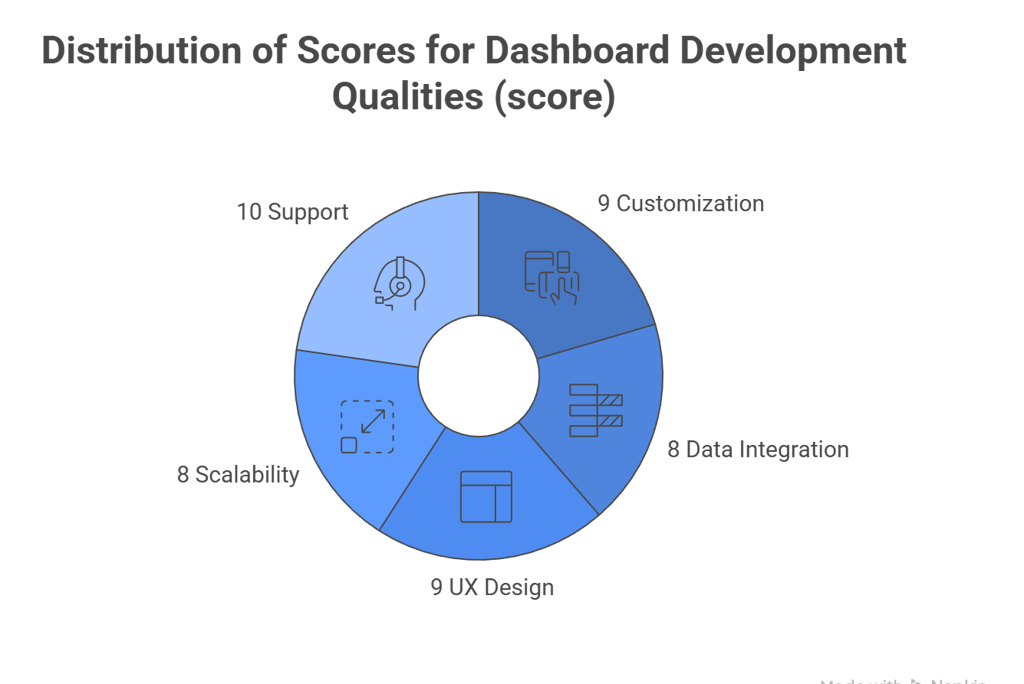
What to Look for in a Dashboard Development Company
Learn what to look for in a dashboard development company. Explore key factors, questions to ask, and how to choose the right BI partner for your business.
BUSINESS INTELLIGENCE
Key Points
A great dashboard development company combines technical skill, business understanding, and data storytelling.
They translate business goals into measurable KPIs and design dashboards that make insights clear and actionable.
Strong data integration experience is essential to connect CRMs, ERPs, spreadsheets, and other sources seamlessly.
User experience, scalability, and industry-specific expertise ensure dashboards are intuitive and grow with your business.
Key questions before hiring include platforms, data integration, accuracy, post-launch support, and security practices.
Evaluate partners by reviewing demos, understanding of KPIs, scalability, pricing transparency, and client feedback.
Actionable takeaway: Identify your business goals and KPIs, then select a dashboard partner who integrates your data, prioritizes usability, and offers ongoing support for scalable, real-time insights.
Introduction
Every modern business relies on data. Yet, without the right dashboards, even the best data can remain hidden and unused. That’s why choosing the right dashboard development company matters more than ever.
A good dashboard isn’t just a collection of charts. It’s a live system that helps teams see performance clearly, track results in real time, and act faster. But with so many service providers, it’s hard to know who can deliver dashboards that truly make a difference.
This guide breaks down what defines a great dashboard development partner, what questions to ask before hiring one, and how to measure whether they’re the right fit for your business.
What Makes a Good Dashboard Development Company?
The best dashboard partners combine technical expertise, business understanding, and data storytelling. Their goal is not only to build dashboards but to help clients make sense of complex information.
1. They translate business goals into measurable KPIs
A skilled team begins with understanding what success looks like for your organization. According to a 2023 Gartner report, 74% of companies are working to build a data-driven culture, but many fail due to unclear objectives. A reliable dashboard company will help define and visualize those goals clearly.
2. They understand data integration
Most companies store data in multiple tools, CRMs, ERPs, spreadsheets, and cloud apps. The right partner should have strong integration experience. As McKinsey & Company notes, data integration is one of the top factors influencing digital transformation success.
3. They focus on user experience
A dashboard should be intuitive. If decision-makers can’t interpret it quickly, the design has failed. A good dashboard development company blends technical architecture with design thinking to keep insights clear and usable.
4. They have proven industry experience
Experience in your sector means faster understanding of metrics and context. For example, financial dashboards differ greatly from manufacturing ones. Reviewing case studies or asking for relevant examples is essential before hiring.
5. They prioritize scalability
Your data will grow. Dashboards must grow with it. Scalable design prevents expensive rebuilds later and ensures your system performs well as more users and data sources are added.
Why technical expertise alone isn’t enough
Many technically capable teams still struggle to deliver business results because they lack context. The most successful BI partners bridge that gap. They combine technical skill with strategic understanding.


What Questions Should You Ask Before Hiring a Dashboard Partner?
Hiring a dashboard developer is like hiring a long-term collaborator. The right questions can reveal whether they’ll be reliable beyond the first delivery.
1. What platforms and tools do they specialize in?
Ask which technologies they use for dashboard creation (such as Power BI, Tableau, or custom-built systems). Each platform has strengths depending on your goals and data structure.
2. Can they integrate data from multiple systems?
Your dashboards are only as powerful as the data they connect to. Integration with CRMs, accounting tools, and marketing platforms should be seamless. According to Forrester, businesses that unify data sources are 2.5 times more likely to outperform peers in decision-making speed.
3. How do they ensure data accuracy and performance?
Real-time insights require both speed and reliability. Ask about their process for data validation, refresh schedules, and performance optimization.
4. Do they offer post-launch support and iteration?
A dashboard is never truly “done.” The best companies provide ongoing maintenance, training, and performance monitoring. BI-as-a-Service (BIaaS) models, for example, offer continuous updates and technical support.
5. How do they handle security and data privacy?
Data security is non-negotiable. Ensure your provider follows encryption standards and complies with relevant data protection laws. The World Economic Forum reported that 43% of organizations faced increased data security risks during digital transformation efforts in 2024.
Red flags to watch for
Be cautious if a company:
Avoids detailed answers about methodology.
Has no live demos or portfolio samples.
Overpromises quick delivery for complex projects.
Lacks transparent pricing or clear timelines.
How Do You Measure If a Dashboard Partner is the Right Fit?
Once you’ve shortlisted potential partners, assess their alignment with your business strategy, communication style, and technical flexibility.
1. Evaluate their understanding of your KPIs
A reliable provider doesn’t just ask for data access — they ask about your business objectives and decision workflows.
2. Ask for sample dashboards or demos
Seeing examples of previous work helps you evaluate both design clarity and data depth. It also shows how they handle real-world complexity.
3. Assess scalability and future support
Ensure they can handle new data sources or additional departments as your business grows. Look for modular architecture and flexible licensing models.
4. Check for transparent pricing
A professional dashboard development company should clearly outline what’s included — from design and data setup to training and post-launch updates.
5. Review testimonials and partnerships
Client feedback reveals consistency, communication, and trustworthiness. A partner with long-term clients likely provides ongoing value.
What successful partnerships have in common
Strong collaboration, transparent communication, and commitment to continuous improvement. These traits turn a vendor into a true data partner.
How Exology Helps
Selecting the right dashboard development company is about finding a partner who understands both your data and your goals. Exology delivers that partnership through expertise, scalability, and ongoing support.
End-to-end dashboard solutions: We design and develop fully customized business intelligence dashboards that align with each company’s strategy, KPIs, and internal workflows.
Regional and global experience: Exology has delivered dashboards for organizations across Egypt, the MENA region, and international markets, adapting to diverse data environments and industry needs.
Unified data ecosystem: Our solutions integrate data from CRMs, ERPs, marketing tools, and financial systems into one secure, real-time dashboard, enabling fast, confident decisions.
BIaaS (Business Intelligence as a Service): Through our subscription-based BIaaS model, companies receive continuous updates, performance optimization, and dedicated technical support without hidden costs.
Scalable architecture: Dashboards are built to grow with your business — from a single department view to enterprise-wide analytics, ensuring long-term value and minimal rebuild costs.
Focus on design and usability: We prioritize clarity and accessibility, making complex data simple for every decision-maker.
Enterprise-grade security: Every dashboard is developed with advanced data encryption, access controls, and compliance standards to protect sensitive business information.
Hands-on collaboration: From discovery to deployment, our team works closely with clients to understand objectives, refine metrics, and ensure smooth adoption.
Experience it live: You can book a free demo to see how Exology transforms scattered data into actionable insight through interactive, real-time dashboards.
Conclusion
Choosing the right dashboard development company can determine how effectively your organization uses its data. Look for a partner who understands your goals, designs with clarity, and supports long-term scalability.
A great dashboard partner doesn’t just build visuals, they empower better decisions. If you’re ready to see how a tailored dashboard can work for your business, book a free demo with Exology and experience your data from a whole new perspective.
Read More
Contact us
Whether you have a request, a query, or want to work with us, use the form below to get in touch with our team.




